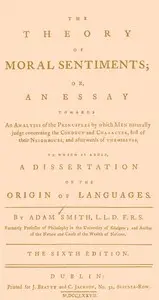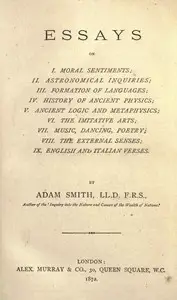
Adam Smith
Adam Smith was a Scottish economist and philosopher who was a pioneer in the thinking of political economy and key figure during the Scottish Enlightenment. Seen by some as "The Father of Economics" or "The Father of Capitalism", he wrote two classic works, The Theory of Moral Sentiments (1759) and An Inquiry into the Nature and Causes of the Wealth of Nations (1776). The latter, often abbreviated as The Wealth of Nations, is considered his magnum opus and the first modern work that treats economics as a comprehensive system and as an academic discipline. Smith refuses to explain the distribution of wealth and power in terms of God's will and instead appeals to natural, political, social, economic, legal, environmental and technological factors and the interactions among them. Among other economic theories, the work introduced Smith's idea of absolute advantage.

An Inquiry Into the Nature and Causes of the Wealth of Nations
"An Inquiry Into the Nature and Causes of the Wealth of Nations" by Adam Smith is a foundational work in political economy written in the late 18th ce...
By Adam Smith

The Theory of Moral Sentiments Or, an Essay Towards an Analysis of the Principles by Which Men Naturally Judge Concerning the Conduct and Character, First of Their Neighbours, and Afterwards of Themselves. to Which Is Added, a Dissertation on the Origin of Languages.
"The Theory of Moral Sentiments" by Adam Smith is a philosophical treatise written in the mid-18th century. The book explores the principles that gove...
By Adam Smith

An Inquiry into the Nature and Causes of the Wealth of Nations
Also known as: Wealth of Nations
By Adam Smith

The Essays of Adam Smith
"The Essays of Adam Smith" by Adam Smith is a collection of philosophical essays written in the 18th century. This work explores a variety of topics i...
By Adam Smith
